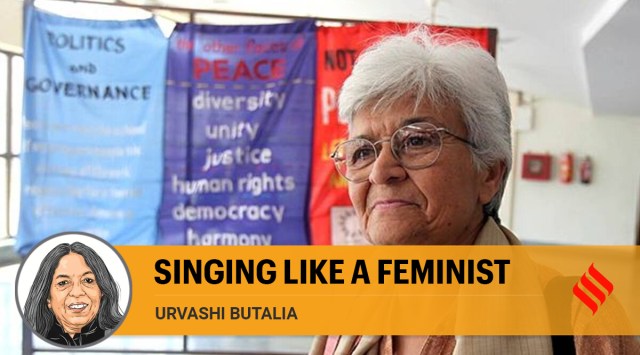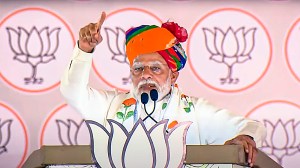- India
- International
How Kamla Bhasin made South Asian feminism a force
Urvashi Butalia writes: She built institutions and solidarities with her unusual feminist weapons — laughter, songs, slogans and art
 Kamla Bhasin passed away at the age of 75. (Express Archive)
Kamla Bhasin passed away at the age of 75. (Express Archive)At Kamla Bhasin’s funeral on Saturday, people stood silently as her sister, Bina, performed the last rites. Shortly after, a young woman began a “conversation” with Kamla, addressing her as if she were still alive. Words turned into song and soon the entire gathering of feminist activists — working-class, elite, religious, non-religious, old, young and others whose lives Kamla had touched, broke into song.
As Kamla’s favourite songs, many that have become anthems for the women’s movement, rang out across the cremation ground, people tapped their feet, clapped their hands, swayed to the rhythm and then, gradually, fell silent. A group of women — her close friends, her beloved relatives — then lifted her and took her in for her last departure. Inside they raised slogans, those she had shouted in so many feminist gatherings, and once again they sang songs of farewell and love.
Ever since her aggressive cancer was diagnosed three months ago, Kamla knew she did not have long to live and joked often of the bulawa that was imminent. In hospital, on what was to be her last day, she fought energetically to live, and demanded that her hair be blow-dried, her toenails painted. Back home the next day, the life now gone out of her, her face still held her characteristic smile, mischief lurking at its edges.
It was some 40 years ago that Kamla Bhasin arrived on the feminist scene in Delhi. In one of our early encounters at an anti-dowry protest, she brought along her husband and daughter — at the time an infant — and they soon became a constant feature of our marches.
Later, in our street play, Om Swaha, she became the sutradhar, energetically sounding the damru, laughingly making up nonsense rhymes to invite bystanders and curious onlookers into the play, disarmingly making spontaneous comments on now a shirt, now a dupatta, making them feel special. I think it was perhaps that moment that turned her into the ace communicator she was to become later in life, talking with equal ease to a grassroots worker or an international official.

At the time, she had a day job with the Food and Agricultural Organisation, and her offices were located inside the UN building in Delhi, an unlikely locale for a woman who was much more at home spinning and rocking on her feet in the streets. But it was the South Asian regional remit of that job that Kamla would return to in her activist years, to build enduring solidarities and friendships across the South Asian region, and to make South Asian feminism a force.
She did this through her formidable and unusual “arsenal” of feminist weapons: Laughter, joy, friendship, songs, slogans, art, dance, books and so much more. She organised — often with the dancer Chandralekha — some of the early feminist poster-making workshops. In one of these was created the iconic poster that announced the arrival of her particular brand of feminist math: One-plus-one equals 11.
She set up institutions and campaigns: Jagori, of which she was an integral part, Sangat, through which she shared feminist concepts with less privileged women, One Billion Rising, a campaign that attempted to show that the numbers of women demanding their rights ran into billions.
Her enthusiasm and commitment to the women’s movement — her home and her belonging — meant that even personal tragedies, the loss of her young daughter, the lifelong illness of her son, did not deter her and she bounced back from each one, the laughter intact on her face, the hurt hidden in her heart. One of her favourite coinages was: “One does not fall in love, one rises in love” — something that was the truth of her life. Many such were shared privately with her feminist comrades amid much laughter: “Mary conceived without sinning, oh Lord let me sin without conceiving”, “We don’t want copper-T, we want proper T” and a song, “Amma dekh, amma dekh, teri movement bigda jaye”!
Kamla’s life was also a testament to that most precious of things that feminism across the world has given us: The strength of female friendships. When a powerful critique was mounted against her on social media for statements she made on trans issues, it was her close group of friends that rallied round her and helped her understand the harm her words could do.
It was these same friends, spread across different cities and countries, who came together when her illness was diagnosed to help her sort out her affairs — the most important of which was the care of her son — and who created a roster of weekly support, putting their lives on hold to be with her full time as carers for that period. To be able to so generously give of the immense store of love that you have, and to be its recipient in equal measure, was something that came effortlessly to Kamla.
In our patriarchal world, the passing of a feminist life is rarely seen as a loss to society. In the last few months, we have seen several such departures: Gail Omvedt without whose writings and activism our understanding of caste would have been so much poorer; Sonal Shukla, who, like Kamla, made fun, reading, song, dance, and learning the central plank of her work; Rati Bartholomew, who gave her life to theatre. And Kamla herself.
They leave behind a world, more specifically the world of the women’s movement, both enriched and impoverished. Enriched by the lives they fully and generously gave to it and impoverished by the loss of so much more that they had to give.
This column first appeared in the print edition on September 25, 2021 under the title ‘Singing like a feminist’. The writer is publisher, Zubaan
EXPRESS OPINION
Must Read
More Explained
Apr 23: Latest News
- 01
- 02
- 03
- 04
- 05










































